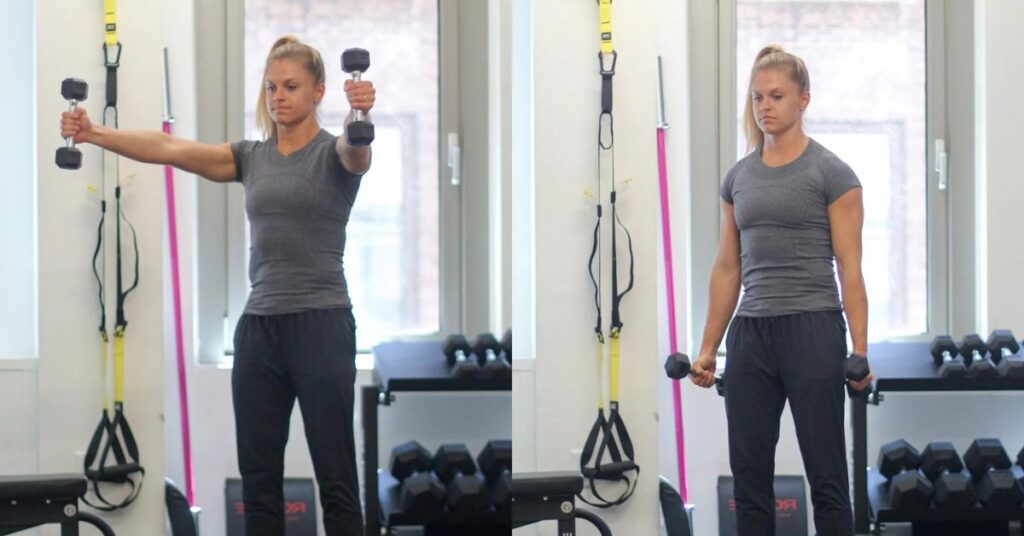More than one million women in the United States experience menopause each year. For many, this can throw a wrench into their fitness routines thanks to the onset of uncomfortable symptoms. Can you blame anyone for wanting to skip the gym after staying up the entire night due to hot flashes?
Widely known as “the change of life,” menopause is an event all women encounter; typically occurring between 45 and 55 years of age. While symptoms vary from woman to woman, for some, menopause can be an extremely difficult time.
“Menopause, marked by hormonal changes, affects various aspects of well-being,” explains Marlyne Perez, registered dietitian nutritionist, certified personal trainer, and physique and NASM bodybuilding coach.
“Symptoms during menopause vary widely, with some experiencing no or minimal effects, while others face severe disruptions impacting daily life,” Perez says. “Common symptoms include hot flashes, night sweats, menstrual irregularities, vaginal discomfort during sexual intercourse due to dryness, incontinence, insomnia, and mood changes.”
These symptoms not only put a damper on your everyday life, but your gym days might take a hit as well, especially if you experience insomnia.
The good news is, there are natural ways to not only help ease the symptoms of menopause but increase your health and well-being as you age.
From strength training to providing your body with the vital nutrients it needs to thrive, Perez shares priceless tips that will give you the support you need during menopause and beyond.
Exercise is a Secret Weapon During Menopause
Whether you’re a regular at the gym or haven’t stepped foot in it in years, exercise is an excellent tool to help keep your body strong during menopause.
For the regular gymgoer, if your fitness routine has been interrupted due to symptoms of menopause, these exercise tips will help get you back in the groove.
“Studies have shown that strength exercises can improve strength and may have a positive impact on metabolic rate and hormone levels,” explains Perez, who strongly recommends not skipping weights during menopause. “Resistance training, as well as weight-bearing exercises, can have a positive impact on body composition by improving lean body mass (aka muscle), which can help boost metabolism.”
With that, it’s time to break a sweat with Perez’s top change-of-life workout tips!
8 Exercise Tips to Power You Through Menopause
- Gradual Progression: If you are just starting, begin with a weight that allows you to perform each exercise with proper form. As you get stronger, gradually increase the weight to continue challenging your muscles.
- Vary Your Intensity: Mixing intensity in your strength training routine can help continue challenging the muscles and maximizing growth. This can involve using heavier weights for fewer repetitions (low reps (between 6-10 reps), high weight) and lighter weights for more repetitions (high reps (between 12-15 reps), low weight). Periodically changing the number of repetitions and sets performed can help prevent plateaus and keep your workouts challenging.
- Workout Tip: Warm up your muscles before starting your strength training session to increase blood flow and flexibility. Cooling down afterward can aid in recovery and reduce muscle soreness.
- Focus on Compound Movements: Compound exercises work multiple muscle groups simultaneously and are highly effective in building overall strength. Examples include squats, deadlifts, bench press, push-ups, pull-ups, and overhead press.
- Balance Cardio and Strength Training: While strength training is essential, incorporating cardiovascular exercise is also beneficial for heart health and overall well-being. Moderate-intensity exercise, such as a brisk 20- to 300-minute walk, a cycle ride, or swimming on most days of the week can help relieve stress, gently work your muscles, and lifts your aerobic output, helping you burn calories and belly fat. Weather-permitting, sunshine can boost vitamin D levels and help your body maintain hormonal balance. Practicing yoga is another way to help calm the mind and reduce cortisol while toning the core and improving balance.
- Consistency: Consistency is key to seeing progress. Aim for regular strength training sessions, ideally at least two to three times per week.
- Adapt to Your Body’s Needs: Pay attention to how your body responds to strength training. If you experience joint pain or discomfort, consider modifying exercises or using alternative movements to protect your joints.
- Mind-Body Connection: Focus on the mind-muscle connection during strength training to maximize strength-training effectiveness. Example: if doing bicep curls, visualize the bicep being worked as you move through the movement. This may help increase activation of the target muscle to improve hypertrophy (aka muscle gains).
Good to Know: Steer Away from Stress. “It is also important to note that chronic stress can feed belly fat, especially when estrogen levels are imbalanced, so the regular practice of reducing cortisol levels can help women in menopause mitigate these belly fat deposits and improve overall body composition,” explains Perez.
While we can’t always avoid stress, finding ways to manage it healthily is key. Take it to the gym and leave it there.
Nutrition to Nourish Your Body (and Mind) in Menopause
Now that you know how to work out during menopause, Perez shares nutrition tips that will fuel your body and mind as you navigate this new chapter.
Nutrition plays a crucial role in managing menopausal symptoms and promoting overall well-being. Here are Perez’s top 6 nutrition tips:
- Keep Hydration Optimal: Staying well hydrated can combat symptoms such as night sweats and hot flashes, relieve potential menopausal nausea, possibly improve brain function, make skin, hair, and nails healthier, reduce bladder irritation, reduce the intensity and frequency of headaches, and ease muscle and other cramps.
- Lean Proteins: Opt for lean protein sources such as poultry, grass-fed lean beef, fish, tofu, beans, and legumes to support muscle mass, maintain a healthy weight, support hormone production, and overall cellular function.
- Boost Calcium and Vitamin D: Menopausal women are at an increased risk of bone loss, so it’s essential to ensure an adequate intake of calcium and vitamin D. Good sources of calcium include dairy products, leafy green vegetables, and fortified plant-based milk. Vitamin D can be obtained through sunlight exposure and foods like fatty fish and fortified dairy products.
- Consume Healthy Fats: Healthy fats are beneficial for heart health and can help manage weight, which may become more challenging during menopause. Include healthy fats in your diet, such as avocados, nuts, seeds, and fatty fish.
- Enjoy Fiber-Rich Foods: A diet rich in fiber can support digestive health and manage weight. Whole grains, fruits, vegetables, and legumes are excellent sources of fiber. Fiber can also help alleviate symptoms like bloating and constipation, which are common during menopause.
- Try Phytoestrogen-Rich Foods: Phytoestrogens are plant compounds that have a mild estrogen-like effect and may help alleviate some menopausal symptoms. Include foods rich in phytoestrogens, such as soy products (tofu, tempeh, edamame), flaxseeds, and whole grains, in your diet.
Final Thoughts:
While menopause may look different for everyone, with a solid workout routine and clean, intentional nutrition, you’ll give your body the fighting chance it needs to manage possible symptoms while building your physical and mental health.

